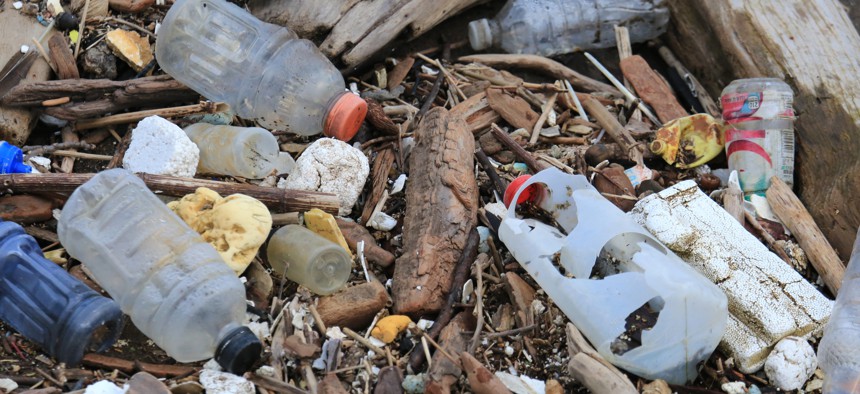A New Bill in Washington State Seeks to Reduce Unneeded Packaging

Douglas Sacha via Getty Images
Laws requiring companies to cover the costs of recycling services are gaining momentum in the U.S. Washington is one of the latest states to consider a strategy that is popular in Europe.
The potato chip bag. The toothpaste tube. The pizza box. These are some of the most common household packages, and yet, they often aren’t recyclable. Instead, they end up in landfills.
That, according to Washington state Rep. Liz Berry, needs to change.
“We're leaving so much material on the table, so to speak. Too much of it is going to landfills,” she said in an interview with Route Fifty. “We know we've got to do better if we're going to save our planet.”
Earlier this month, Berry and state Sen. Christine Rolfes, both Democrats, introduced the Washington Recycling and Packaging Act, or WRAP Act. Among its many initiatives, the massive recycling bill would require product manufacturers and brands to pay for recycling services in the state.
While Washington has one of the highest recycling rates in the country, it’s been in decline since 2011, according to the bill, and more than 50% of consumer packaging ends up in landfills. The WRAP Act aims to modernize the state’s recycling system.
Under the bill, companies would join and pay fees to an entity called a producer responsibility organization. Materials that are difficult to recycle, like the layers of plastic in that potato chip bag or bottle of water, would warrant higher fees, while products like paper and aluminum would require lower fees, Berry explained.
“If it affects their bottom line, they're incredibly motivated to find alternatives,” she said.
The initiative would exclude companies that sell less than one ton of packaged products and those that have less than $5 million in global revenue.
Laws requiring companies to cover the costs of recycling services are gaining momentum in the U.S. Washington is one of the latest states to consider a strategy that is already popular and well established in Europe and British Columbia. Known as extended producer responsibility (EPR) programs, they don’t always have to center around packaging and can be created for other difficult materials like carpets, paint and batteries.
Maine became the first state to approve EPR legislation for packaging in 2021. Since then, Oregon, Colorado and California have followed suit. So far this year, New Jersey and Tennessee have joined Washington in introducing EPR bills. And in the coming year, still more states—including Connecticut, Michigan and New York—are likely to propose their own EPR programs, according to Miho Ligare, plastic pollution policy manager for the Surfrider Foundation, an environmental advocacy organization based in California.
In the states where EPR legislation has already been approved, it’s still too early to gauge their success, Ligare said. But she added, if done well, EPR programs can be more comprehensive and impactful than single product bans like banning plastic bags or Styrofoam. “With extended producer responsibility,” she said, “it's looking at all the packaging.”
In addition to the fees, the WRAP Act would also require producers to use more recycled materials in their products and create a bottle return system.
Under the bottle return system, consumers would pay 10 cents upfront when purchasing bottled products and would be reimbursed when returning the empty containers to a drop-off location. It’s similar to a successful initiative in Oregon and aims to not only reduce litter but also keep bottles separate from other recyclable materials, making it easier to reuse them more efficiently.
“What we've been trying to do is create a circular economy in the U.S. and in Washington,” said Heather Trim, executive director of Zero Waste Washington. “And so you really need the bottles and beverage containers to be super clean and well sorted, and this sort of naturally sorts them right upfront.”
But at the bill’s public hearing before the environment and energy committee earlier this month, some recycling professionals criticized the bottle deposit program. The initiative would divert materials away from the existing recycling system, said Jay O’Neal, the general manager for the Republic Services materials recovery facility in Seattle, resulting in revenue loss for waste management companies. Those companies may have to raise rates to offset the loss.
Others at the hearing expressed concern about the WRAP Act’s scope and ambitious timetable, which sets minimum requirements for products to contain a certain amount of recycled material as early as 2026, with increasing amounts in the following years.
“[At] 143 pages, this bill is already quite long and complex with very aggressive timelines,” said Peter Godlewski, government affairs director for the Association of Washington Business.
Washington lawmakers have considered EPR bills before, but the proposals have never made it beyond the state senate’s ways and means committee, Trim said. But she added that she’s feeling optimistic about the bill being considered in the current legislative session, in part because of how many other states have approved their respective producer responsibility bills. This year will also be a longer legislative session than last year for the Washington Legislature, which alternates between 60- and 105-day sessions.
Molly Bolan is the assistant editor for Route Fifty.
NEXT STORY: Pain of Police Killings Traumatizes Black People and Communities Across US






